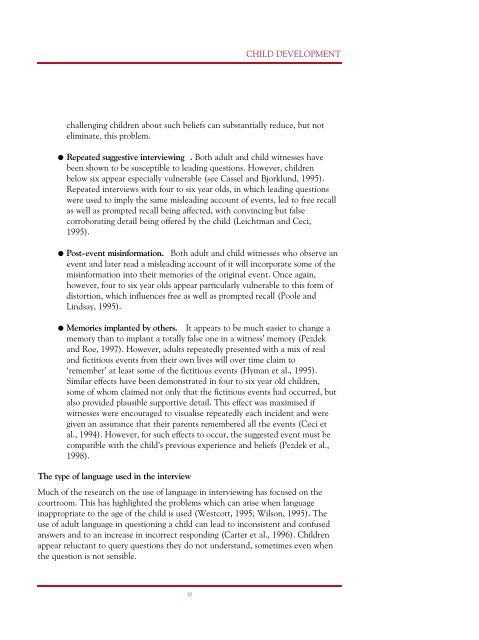Interviewing Child Witnesses under the Memorandum of Good ...
Interviewing Child Witnesses under the Memorandum of Good ...
Interviewing Child Witnesses under the Memorandum of Good ...
You also want an ePaper? Increase the reach of your titles
YUMPU automatically turns print PDFs into web optimized ePapers that Google loves.
CHILD DEVELOPMENT<br />
challenging children about such beliefs can substantially reduce, but not<br />
eliminate, this problem.<br />
● Repeated suggestive interviewing . Both adult and child witnesses have<br />
been shown to be susceptible to leading questions. However, children<br />
below six appear especially vulnerable (see Cassel and Bjorklund, 1995).<br />
Repeated interviews with four to six year olds, in which leading questions<br />
were used to imply <strong>the</strong> same misleading account <strong>of</strong> events, led to free recall<br />
as well as prompted recall being affected, with convincing but false<br />
corroborating detail being <strong>of</strong>fered by <strong>the</strong> child (Leichtman and Ceci,<br />
1995).<br />
● Post-event misinformation. Both adult and child witnesses who observe an<br />
event and later read a misleading account <strong>of</strong> it will incorporate some <strong>of</strong> <strong>the</strong><br />
misinformation into <strong>the</strong>ir memories <strong>of</strong> <strong>the</strong> original event. Once again,<br />
however, four to six year olds appear particularly vulnerable to this form <strong>of</strong><br />
distortion, which influences free as well as prompted recall (Poole and<br />
Lindsay, 1995).<br />
● Memories implanted by o<strong>the</strong>rs. It appears to be much easier to change a<br />
memory than to implant a totally false one in a witness’ memory (Pezdek<br />
and Roe, 1997). However, adults repeatedly presented with a mix <strong>of</strong> real<br />
and fictitious events from <strong>the</strong>ir own lives will over time claim to<br />
‘remember’ at least some <strong>of</strong> <strong>the</strong> fictitious events (Hyman et al., 1995).<br />
Similar effects have been demonstrated in four to six year old children,<br />
some <strong>of</strong> whom claimed not only that <strong>the</strong> fictitious events had occurred, but<br />
also provided plausible supportive detail. This effect was maximised if<br />
witnesses were encouraged to visualise repeatedly each incident and were<br />
given an assurance that <strong>the</strong>ir parents remembered all <strong>the</strong> events (Ceci et<br />
al., 1994). However, for such effects to occur, <strong>the</strong> suggested event must be<br />
compatible with <strong>the</strong> child’s previous experience and beliefs (Pezdek et al.,<br />
1998).<br />
The type <strong>of</strong> language used in <strong>the</strong> interview<br />
Much <strong>of</strong> <strong>the</strong> research on <strong>the</strong> use <strong>of</strong> language in interviewing has focused on <strong>the</strong><br />
courtroom. This has highlighted <strong>the</strong> problems which can arise when language<br />
inappropriate to <strong>the</strong> age <strong>of</strong> <strong>the</strong> child is used (Westcott, 1995; Wilson, 1995). The<br />
use <strong>of</strong> adult language in questioning a child can lead to inconsistent and confused<br />
answers and to an increase in incorrect responding (Carter et al., 1996). <strong>Child</strong>ren<br />
appear reluctant to query questions <strong>the</strong>y do not <strong>under</strong>stand, sometimes even when<br />
<strong>the</strong> question is not sensible.<br />
10

















